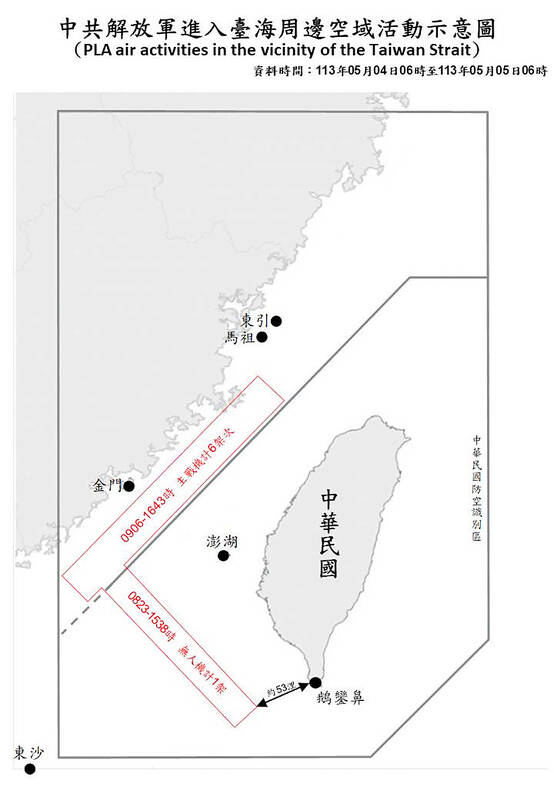Taiwan should create a military aviation law to give legal protection to its air defense identification zone (ADIZ) in counteracting Chinese People’s Liberation Army (PLA) drones, National Defense University associate professor of law and military officer Lee Yen-chang (李彥璋) said on Saturday.
The PLA has increased its efforts to compress Taiwan’s defensive area by crossing into the latter’s ADIZ with ships and aircraft including uncrewed aerial vehicles, major Yen wrote in an article published in this month’s issue of Air Force Bimonthly.
The Chicago Convention on International Civilian Aviation, which governs transnational civilian flights, neither allows nor forbids governments from staking out its ADIZs, he said.

Photo courtesy of the Ministry of National Defense
This means ADIZs have an unclear legal status in international law, and the right to self-defense inside an ADIZ is conditional, he said.
The legitimate exercise of the right to self-defense by a nation state must be an appropriate, necessary, incremental and proportional response to actions causing actual harm, instead of merely posing a military threat, Yen said.
The bounds of the nation’s ADIZ were unilaterally established by the Civil Aviation Administration and far exceed the military’s requirement for a reasonably delineated defensive zone, he said.
The military and civilian administration of the zone should have been kept separate due to differences in their purpose, even if the designated air space were identical, Yen said.
The nation did not create clear legal guidelines for the armed forces dealing with foreign aircraft to counter Beijng’s challenges to its authority, he said.
Legislating a military aviation law would address these issues and form the basis of a common standard to govern ADIZ claims in the region, Yen said.
International law is indifferent to ADIZs which are created unilaterally by national governments, Institute for National Defense and Security Research research fellow Su Tzu-yun (蘇紫雲) said.
The proposed promulgation of a military aviation law would provide Taiwanese air and air defense units with rules for handling unidentified aircraft outside the nation’s sovereign airspace, he said.
Most countries use their civil aviation laws to govern ADIZs enforcement, but Taiwanese civil aviation authorities are not sufficiently familiar with military requirements to propose legislation on the matter, he added.
Institute associate research fellow Shu Hsiao-huang (舒孝煌) said that Taiwan has to rethink the bounds of its ADIZ, which extends into the Chinese provinces of Zhejiang and Jiangxi.
These ADIZ claims might be valid in domestic law but are meaningless because they include airspace that the nation’s military aircraft cannot go into, he added.

TRAFFIC SAFETY RULES: A positive result in a drug test would result in a two-year license suspension for the driver and vehicle, and a fine of up to NT$180,000 The Ministry of Transportation and Communications is to authorize police to conduct roadside saliva tests by the end of the year to deter people from driving while under the influence of narcotics, it said yesterday. The ministry last month unveiled a draft of amended regulations governing traffic safety rules and penalties, which included provisions empowering police to conduct mandatory saliva tests on drivers. While currently rules authorize police to use oral fluid testing kits for signs of drug use, they do not establish penalties for noncompliance or operating procedures for officers to follow, the ministry said. The proposed changes to the regulations require

Taipei, New Taipei City, Keelung and Taoyuan would issue a decision at 8pm on whether to cancel work and school tomorrow due to forecasted heavy rain, Keelung Mayor Hsieh Kuo-liang (謝國樑) said today. Hsieh told reporters that absent some pressing reason, the four northern cities would announce the decision jointly at 8pm. Keelung is expected to receive between 300mm and 490mm of rain in the period from 2pm today through 2pm tomorrow, Central Weather Administration data showed. Keelung City Government regulations stipulate that school and work can be canceled if rain totals in mountainous or low-elevation areas are forecast to exceed 350mm in

EVA Airways president Sun Chia-ming (孫嘉明) and other senior executives yesterday bowed in apology over the death of a flight attendant, saying the company has begun improving its health-reporting, review and work coordination mechanisms. “We promise to handle this matter with the utmost responsibility to ensure safer and healthier working conditions for all EVA Air employees,” Sun said. The flight attendant, a woman surnamed Sun (孫), died on Friday last week of undisclosed causes shortly after returning from a work assignment in Milan, Italy, the airline said. Chinese-language media reported that the woman fell ill working on a Taipei-to-Milan flight on Sept. 22

1.4nm WAFERS: While TSMC is gearing up to expand its overseas production, it would also continue to invest in Taiwan, company chairman and CEO C.C. Wei said Taiwan Semiconductor Manufacturing Co (TSMC) has applied for permission to construct a new plant in the Central Taiwan Science Park (中部科學園區), which it would use for the production of new high-speed wafers, the National Science and Technology Council said yesterday. The council, which supervises three major science parks in Taiwan, confirmed that the Central Taiwan Science Park Bureau had received an application on Friday from TSMC, the world’s largest contract chipmaker, to commence work on the new A14 fab. A14 technology, a 1.4 nanometer (nm) process, is designed to drive artificial intelligence transformation by enabling faster computing and greater power